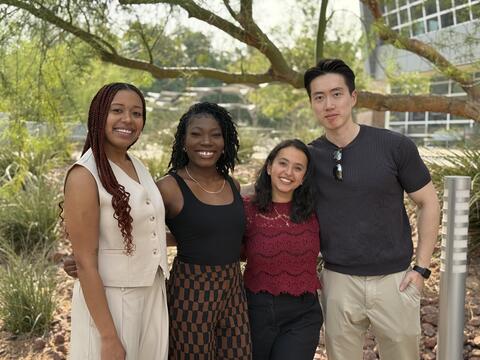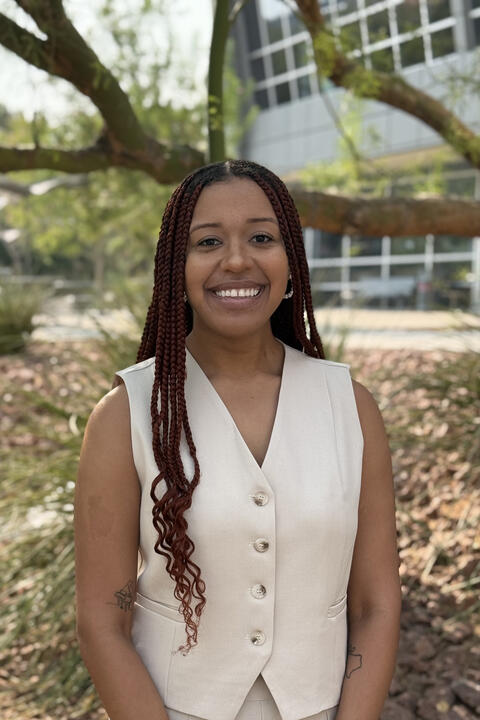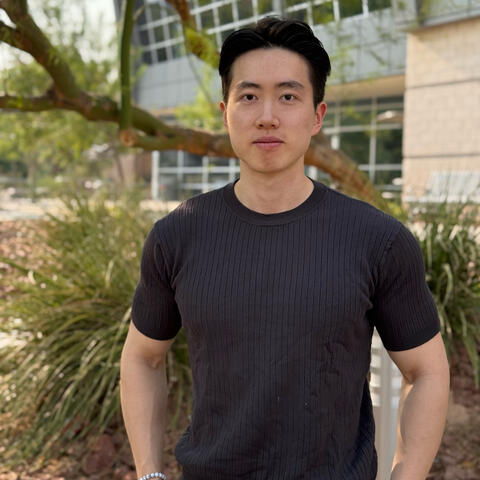
CONTACT
Sonaly Silva, Psy.D.
Associate Director of Training
702-895-3627
christeensonaly.silva@unlv.edu

Bella Attalla, M.A.
Clinical Supervisor: Ramy Bassioni, PhD
Bella Attalla (She/Her) was born and raised in Egypt. She completed her bachelor’s degree in Psychology and Social Behavior at the University of California, Irvine. During her undergraduate years, she volunteered in a mentorship program that supported incoming freshmen as they adjusted to college life. She is currently completing her doctoral degree in Clinical Psychology at Azusa Pacific University in Southern California.
Her dissertation research focuses on addressing gaps in the literature regarding the Middle Eastern and North African (MENA) population, with a specific emphasis on Adverse Childhood Experiences (ACEs) within the Egyptian community. In her clinical work, Bella utilizes an integrative approach grounded in Cognitive Behavioral Therapy (CBT) and psychodynamic theories. She has a strong passion for working with MENA individuals, immigrants, people of color, and clients seeking faith-integrated services.
In her free time, Bella enjoys spending time with her family, friends, and her dog. She also enjoys going to the gym, watching movies, and exploring new places.

Bianca Broomfield, M.A.
Clinical Supervisor: Cheryl Chakranarayan, PhD
Bianca Broomfield (She/Her) is a doctoral intern from Alliant International University’s LA campus, earning her Ph.D. in Clinical Psychology with a concentration in multicultural communities. She earned her bachelor’s degree in psychology from Dillard University in New Orleans, Louisiana.
Bianca has experience working with individuals from diverse cultural backgrounds, including BIPOC and first-generation college students. She has worked with individuals navigating trauma, racial identity, impostorism, anxiety, depression, and several other unique challenges. She takes a person-centered, psychodynamic approach to therapy to support individuals as they own their experiences and take back their autonomy to be the best version of themselves.
Bianca strives to create a therapeutic space that welcomes authenticity, vulnerability, and transformation. She is committed to meeting people where they are and encouraging them to forge their unique paths for the future, while healing from the past and learning healthy tools for coping with life's challenges.

Savacia Farmer, M.S.
Clinical Supervisor: Alyssa Newman, PsyD
Savacia Farmer or Vacie (she/her) is originally from Austin, Texas. She completed her bachelor’s degree in Kinesiology - Fitness Studies from Louisiana State University in 2017, a master’s degree in Sport, Exercise, and Performance Psychology from Barry University in 2020, and a master’s degree in Clinical Psychology from Nova Southeastern University in 2023. She is currently pursuing a PsyD in Clinical Psychology from Nova Southeastern University in Fort Lauderdale, Florida where her area of focus is sport psychology and performance enhancement.
Clinically, Vacie has experience working with diverse populations ranging from college-aged individuals to older adults across multiple settings. Her clinical interests include sport psychology and performance enhancement for youth, collegiate, and professional athletes, as well as counseling services for the general college population.
In therapy, she is rooted in cognitive-behavioral principles, yet utilizes an integrative approach to treatment and conceptualization to meet the individual’s needs from a multicultural lens. Diversity and inclusion are an integral part of her theoretical approach. In her free time, Vacie enjoys watching sports (Geaux Tigers and Dallas Cowboys!), attending shows and concerts, going dancing, and exploring new restaurants with friends and family.

Zhipei Sun, M.A.
Clinical Supervisor: Marijo Villano, PhD
Zhipei (He/Him) is a fifth-year doctoral student in the PsyD program at the Wright Institute in the Bay Area. He was born and raised in Beijing, China. In 2018, he earned his B.A. in Psychology (Intensive Track) from the University of California, Santa Cruz, and in 2020, he completed a master’s degree in Clinical Psychology with a concentration in Psychotherapy at Teachers College, Columbia University.
Clinically, Zhipei primarily practices third-wave Cognitive Behavioral Therapy (CBT) within a transdiagnostic framework. He also integrates elements of psychodynamic, existential, and family systems theories when appropriate to best support his clients’ needs. He has experience working with diverse individuals, couples, and groups navigating a wide range of emotional challenges, life transitions, and mental health concerns.
In his free time, Zhipei trains and competes in natural men’s physique bodybuilding (board shorts division). Since 2022, he has made it a personal tradition to take a solo trip each year, it becomes his favorite way to reset, recharge, and explore the world.
About UNLV CAPS
UNLV Student Counseling and Psychological Services (UNLV CAPS) is a department within the Student Wellness unit of the Division of Student Affairs at the University of Nevada, Las Vegas. UNLV CAPS works collaboratively with other Student Wellness departments—including the Student Health Center, Wellness Promotion, Jean Nidetch CARE Center, Office of Student Rights and Responsibilities, Disability Resource Center, Military and Veteran Services, and the University Support Team—to support the overall well-being and success of UNLV students.
UNLV CAPS provides a wide range of services to help students address educational, emotional, social, and personal challenges that may affect their academic success or personal development. Our services include individual and group counseling, crisis intervention, psychiatric services for medication management, outreach and consultation, and training opportunities for emerging mental health professionals.
Our clinicians are experienced in working with the diverse concerns and identities of college students. We partner with students to enhance self-understanding, develop coping and resilience skills, and foster personal growth. UNLV CAPS is dedicated to providing high-quality, culturally responsive, and wellness-focused care that supports student success and contributes to a healthy, inclusive campus community.
Services and Program Objectives:
- Provide initial assessment and recommendations concerning student problems
- Provide crisis assessment, intervention, and follow-up care for students who present at risk for harm
- Provide effective brief clinical interventions to assist students in managing their personal and mental health problems so that they can return to their previous level of functioning
- Provide psychological services sensitive to the cultural and individual diversity of students
- Provide quality services in as short a time as possible
- Provide necessary referral to community providers for students who present with conditions that are beyond CAPS’ scope of services
- Provide assessment, documentation, and referrals in the interest of supporting students’ academic standing
- Provide consultation to students, parents, and spouses of students whose education at the University has been disrupted by personal problems
- Provide consultation and educational services to University faculty and staff for the assistance and referral of students who may be in personal distress
- Provide educational programs, workshops and materials which increase student understanding of common psychological concerns and enable students to take responsibility to develop the personal management skills needed to succeed in the university environment
- Provide comprehensive training to UNLV graduate students who are pursuing careers in the mental health profession
- Provide consultation to students, faculty and staff on psychological processes and issues that will enhance learning and academic success
- Provide ongoing quality assurance of services and programs
Student Wellness Mission Statement
The mission of Student Wellness is to advance the optimal wellness of UNLV students, thereby enhancing their lives and their academic success. To fulfill our mission, Student Wellness affirms the importance of working in partnership with the greater university community; respecting individual differences and cultural diversity; and providing quality services and programs that address the physical, emotional, social, environmental, intellectual, spiritual, and occupational dimensions of life.
CAPS Staff
The professional staff consists of psychologists, licensed clinical social workers, licensed marriage and family therapists, licensed professional counselors, psychological assistants, psychiatrists, psychiatric nurses, psychiatry residents, and care managers. Additionally, there are a number of administrative staff and student workers who support the clinical staff and assist in CAPS operations. Each year, we typically have approximately 4-5 graduate-level practicum counselors and four doctoral interns.
CAPS is part of the Student Wellness cluster, which embraces balanced, holistic health, and wellness. The doctoral internship is designed to train interns to be competent, entry-level generalist psychologists. The internship training program emphasizes professional identity development, ethical decision making, and multicultural competence. CAPS provide a setting in which interns increase and strengthen their abilities to practice psychology throughout their year. Interns successfully complete their internship when they reach a skill level of intermediate to advanced competence practice defined by having a sufficient ability to practice core skills without ongoing supervision. Training involves developing both core skills, and a positive professional identity that is essential for the work of an entry level psychologist. Interns work with a multidisciplinary staff who offer diverse backgrounds and various theoretical orientations, including evidence-based treatments. Interns have the opportunity to work within a university counseling center that also includes a Psychiatry Team, offering comprehensive medication management and opportunities for case conference experiences as part of collaborative and integrated care. Interns gain experience by participating in a wide range of supervised professional activities within a large, urban, and diverse university counseling center, including:
- Individual, relationship (couples), and group therapy from a brief treatment model.
- Crisis assessment and intervention.
- Intake assessments and diagnosis.
- Individual Supervision.
- Group Supervision (Supervision of Supervision, and Case Conference)
- Seminars (Multicultural Seminar, Outreach & Consultation Seminar, Clinical Issues Seminar, and Teaching, Lifelong Learning, and Competency Seminar).
- Provision of Supervision
- Case management and referrals to community mental health care.
- Outreach, educational workshops and presentations, and consultations across the campus.
- Attendance and participation in staff, Clinical Assessment Team (consultation), Joint Provider (Student Health Center), and Cluster (Student Wellness unit) meetings
- Emphasis Areas: Anxiety, Behavioral Health, Eating Disorders, Trauma, LGBTQ+, Sport Psychology, and Substance Use Disorders. Emphasis areas include one hour of individual supervision/week with licensed staff.
Program Disclosure
After applicants successfully match to our site, they must also do a background check and screening for eligibility requirements. This is a standard procedure for all UNLV employees as doctoral interns are classified as UNLV staff. Further information is available here:
Internship Program Admissions
Briefly describe in narrative form important information to assist potential applicants in assessing their likely fit with your program. This description must be consistent with the program’s policies on intern selection and practicum and academic preparation requirements
The University of Nevada-Las Vegas Student and Counseling and Psychological Services (CAPS) is currently accepting applications for four full-time, one-year, paid (2000 hour) positions for the 2026- 2026 internship year. All the internship training is based on a Practitioner-Scholar model with a primary emphasis on competence in the practice of professional psychology that is influenced by the science of psychology. Theory, research, and practice mutually inform each other. Interns are guided and encouraged in their pursuit of observing, inferring, formulating, and evaluating clinical hypotheses. The integration of science and practice is encouraged through the use of seminars, readings from scholarly publications, generating clinical hypotheses to explore in supervision, learning the empirical bases that guide the use of comprehensive assessment, and participating in professional development activities on best current practices in clinical practice. A part of competent practice also includes being informed about the influential and current theoretical and research-bases of psychology and other related fields, especially evidence-based treatment.
|
|||||
|---|---|---|---|---|---|
| Total Direct Contact Intervention Hours | Yes | Amount: 400 | |||
| Total Direct Contact Assessment Hours | No | Amount: 0 | |||
Describe Any Other Required Minimum Criteria Used to Screen Applicants
Required Qualifications
We do not require any additional supplemental materials other than what is part of the standard AAPI. Please send an electronic copy of all materials via the AAPI website.
We require applicants to have the following:
- Applicants must be enrolled in a program currently accredited by APA or CPA or enrolled in a program that has successfully COMPLETED at least one of the following concrete accreditation milestones by the application deadline:
-
- Submitted for Intent to Apply status
- Submitted an accreditation self-study
- Has been granted an APA/CPA accreditation site visit
-
- 400 hours (minimum) AAPI intervention hours
- Interns who match to our site must have successfully completed all required coursework (specified by their academic program) prior to the start of internship.
- Doctoral comprehensive exams must be passed by ranking deadline.
- Applicants should include as part of their AAPI three references, at least one of whom must have served as a clinical supervisor or directly observed some of the applicant's clinical work.
- Dissertation proposal must be approved by start of internship.
Preferred Qualifications
- Clinical experience with college student population preferred.
- UNLV CAPS seeks individuals who are team players, have strong communication skills, practice good self-care, are open to learning, value consultation and supervision, and value self-reflection as a tool for professional development.
Application Procedures
APPIC Match Number: 2293
Refer to the APPIC website for more details and complete application instructions for applying online. All application materials listed below are uploaded via the APPIC applicant portal. We do not accept any paper materials. Interested candidates should submit:
- Completed AAPI online.
- Cover letter.
- Current curriculum vitae.
- Official graduate transcript(s).
- The Academic Program’s Verification of Internship Eligibility and Readiness.
- Three letters of recommendation, with at least two from clinical supervisors who will speak directly about the quality of your clinical work and your engagement in clinical supervision.
- Background check upon hire, based on Student Wellness requirements.
All materials must be submitted for review online by November 15, 2025. This internship site agrees to abide by the APPIC policy that no person at this training facility will solicit, accept, or use any ranking-related information from any intern applicant. Applicants selected for interviews will be notified by December 15, 2025, and interviews will be conducted via Zoom in early to mid-January 2026.
APPIC Phase I Match Day is Friday, February 20, 2026.
Financial and Other Benefit Support for Upcoming Training Year*
| Annual Stipend/Salary for Full-time Interns | $45,000 |
|---|---|
| Annual Stipend/Salary for Half-time Interns | N/A |
| Program provides access to medical insurance for intern? | Yes |
If access to medical insurance is provided:
| Trainee contribution to cost required? | No |
|---|---|
| Coverage of family member(s) available? | Yes |
| Coverage of legally married partner available? | Yes |
| Coverage of domestic partner available? | Yes |
| Hours of Annual Paid Personal Time Off (PTO and/or Vacation) | 120 hours |
| Hours of Annual Paid Sick Leave | 80 hours |
| In the event of medical conditions and/or family needs that require extended leave, does the program allow reasonable unpaid leave to interns/residents in excess of personal time off and sick leave? | Yes |
Other Benefits (please describe): If an intern needs parental leave, they should consult with the Training Director as soon as feasible, who will consider a multitude of factors and come up with a plan that is in the best interest of the intern’s training needs, CAPS, cohort members, and UNLV.
Initial Post-Internship Positions
Provide an Aggregated Tally for the Preceding 3 Cohorts
| 2022-2025 | |
|---|---|
| Total # of interns who were in the 3 cohorts | 12 |
| Total # of interns who did not seek employment because they returned to their doctoral program/are completing doctoral degree | 1 |
For 2021-2024
| PD | EP | |
|---|---|---|
| Academic teaching | 0 |
1 |
| Community mental health center | 0 | 2 |
| Consortium | 0 | 0 |
| University Counseling Center | 0 | 3 |
| Hospital/Medical center | 0 | 0 |
| Veterans Affairs Health Care System | 0 | 0 |
| Psychiatric facility | 0 | 0 |
| Correctional facility | 0 | 0 |
| Health maintenance organization | 0 | 0 |
| School district/system | 0 | 0 |
| Independent practice setting | 1 | 4 |
| Other | 0 | 1 |
Note: “PD” = Post-doctoral residency position; “EP” = Employed Position. Each individual represented in this table should be counted only one time. For former trainees working in more than one setting, select the setting that represents their primary position.
The UNLV CAPS Doctoral Internship is a 2000-hour experience, with the expectation of 500 hours of direct service activities. Interns will be able to gain experience through a wide range of activities, some of which will be negotiated individually by each trainee based on their interest areas and the needs of the center. The doctoral internship in professional psychology includes these components:
Direct Service:
- Initial Consultations
- Brief Individual and Relationship Therapy
- Group Therapy
- Crisis Coverage (4 hours/week)
- Supervision of a therapist in training
- Consultation
Training Activities:
- Training Seminars, including: Multicultural Seminar, Clinical Issues Seminar, Outreach & Consultation Seminar, and Teaching, Lifelong Learning and Competency Seminar.
- Individual Supervision
- Group Supervision (Intern Case Conference, Supervision of Supervision)
Other Activities:
- Prep time/Admin time/Dissertation time
- Specialty Emphasis depending on the intern interests and center needs.
| Intern weekly Activities | Fall Hours/Week August–December |
Spring Hours/Week January–May |
Summer Hours/Week May–July |
|---|---|---|---|
| Direct Service | |||
| Individual/Couples Therapy* | 12-13 | 12-13 | 14 |
| Initial Consultations | 3-4 | 3-4 | 3-4 |
| Group Therapy | 1.5 | 1.5 | 1.5 |
| Crisis Coverage | 4 | 4 | 4 |
| Clinical Total *Hours will adjust depending on the number of groups |
20.5-21.5 | 20.5-21.5 | 23.5 |
| Other Service | |||
| Supervision of Practicum Student | 1 | 1 | 0 |
| Outreach/Consultation | 1 | 1 | 2 |
| Other Service Total | 2 | 2 | 2 |
| Training | |||
| Individual Supervision | 2 | 2 | 2 |
| Emphasis Area Supervision | 1 | 1 | 1 |
| Supervision of Group Counseling | 0.5 | 0.5 | 0.5 |
| Intern Case Conference (every other week) | 0.5 | 0.5 | 0.5 |
| Clinical Assessment Team Meeting | 1 | 1 | 1 |
| Supervision Seminar/Sup of Sup (weekly) | 1 | 1 | 0 |
| Clinical Issues Seminar | 1 | 1 | 1 |
| Multicultural Seminar (every other week) | 0.5 | 0.5 | 0 |
|
Teaching Lifelong Learning and Competency Seminar |
0.5 | 0.5 | 0.5 |
|
Outreach Seminar (rotate every other week) |
0.5 | 0.5 | 0.5 |
| Training Total | 8.5 | 8.5 | 6 |
| Support Activities | |||
| Seminar Prep Time | 1 | 1 | 1 |
| Administrative/Case Management | 5 | 5 | 5 |
| Staff Meeting | 2 | 2 | 2 |
| Support Activities Total | 8 | 8 | 8 |
| Total | 40 | 40 | 40 |
The UNLV CAPS doctoral internship recognizes the importance of cultural and individual differences and diversity in the training of psychologists. The training program is committed to providing a rich multicultural experience for interns.
As a federally designated Minority-Serving Institution (MSI), UNLV's fall 2020 enrollment statistics reveal that 65% of its students identify as racial or ethnic minorities. This diverse enrollment is further supported by the growing multicultural landscape of Southern Nevada. Over the past decade, UNLV has consistently ranked among the most diverse undergraduate campuses, earning recognition from U.S. News & World Report, which placed UNLV second on its list in 2020, tied with Andrews University in Michigan and only behind the University of Hawaii-Hilo.
In December 2012, the U.S. Department of Education officially designated UNLV as a Minority Serving Institution (MSI). Furthermore, since 2015, the University of Nevada, Las Vegas has been recognized as both an Asian American and Native American Pacific Islander-Serving Institution (AANAPISI) and a Hispanic Serving Institution (HSI).
The UNLV CAPS internship program has been accredited by the American Psychological Association since November 8, 2016. For questions related to the internship program’s accreditation status, please contact the APA Office of Program Consultation and Accreditation:
Office of Program Consultation and Accreditation
750 First St., NE
Washington, DC 20002-4242
Phone: 202-336-5979
Email: apaaccred@apa.org
Website